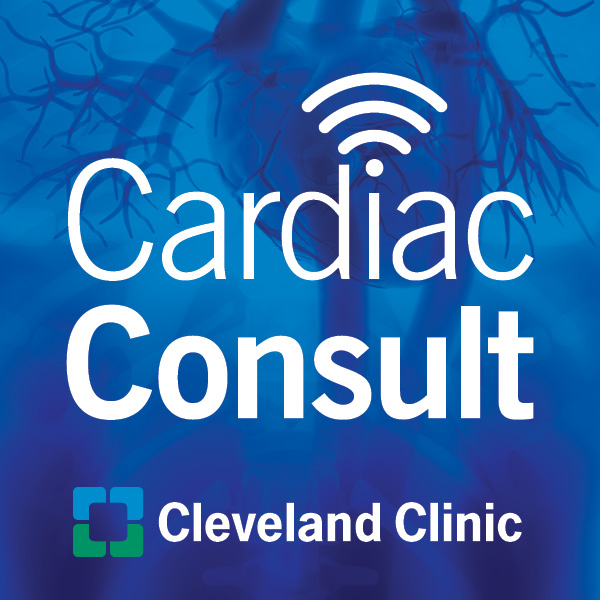Lepodisiran: A Novel Therapy to Reduce Lipoprotein(a)

Steven Nissen, MD, shares the findings from a late breaker he presented at ACC 2025. Lepodisiran is a small interfering RNA that targets lipoprotein(a) levels, lowering a patient's risk for atherosclerosis and aortic stenosis.
Learn more about C5 Research at Cleveland Clinic.
Looking to refer a patient? Please reach out to our Physician Referral team Mon. - Fri., 8 a.m. - 5 p.m. (ET) at 855.751.2469.
Subscribe: Apple Podcasts | Buzzsprout | Spotify
Lepodisiran: A Novel Therapy to Reduce Lipoprotein(a)
Podcast Transcript
Announcer:
Welcome to Cleveland Clinic Cardiac Consult, brought to you by the Sydell and Arnold Miller Family Heart, Vascular and Thoracic Institute at Cleveland Clinic.
Steven Nissen, MD:
I'm Dr. Steve Nissen. I am the Chief Academic Officer of the Heart, Vascular and Thoracic Institute. I'm pleased to talk with you about a study that I presented at the American College of Cardiology meeting and published simultaneously in the New England Journal of Medicine.
This is a study of Lepodisiran. Lepodisiran is a small interfering RNA that targets lipoprotein(a). Lipoprotein(a) is a very important risk factor for cardiovascular disease. It is estimated that at least a billion people globally have this abnormal lipoprotein that promotes atherosclerotic cardiovascular disease and aortic stenosis. Unfortunately, all of the typical therapies that are used for patients at risk for atherosclerotic disease do not lower lipoprotein(a), and that is because it is a pure genetic risk factor for cardiovascular disease.
The only way to lower levels is to silence the gene that's producing this abnormal lipoprotein. We are able to do that now using small interfering RNAs. These are short snippets of RNA that interfere with the translation of the gene. They interfere with the messenger RNA that produces apolipoprotein(a). There are several of these drugs in development, and the study that I presented and published is a study of a particularly interesting small interfering RNA known as Lepodisiran.
Lepodisiran is a different structure from typical small interfering RNAs that has a prolonged duration of action. In the phase two trial, we enrolled 320 patients. They were randomized to a variety of dose groups, ranging from 16mg to 400mg. In the 400mg dose group, which is the target dose group for the phase three trial, we gave either one dose at baseline and followed the patients for 540 days, or we gave one dose at baseline and one dose at day 180, and then followed them again for 540 days.
Now, the study-enrolled patients, typically they were in their early 60s. Their lipoprotein(a) levels were very high, in the range of 215 nanomoles per liter. Keep in mind that for most laboratories, a normal level is less than 75 nanomoles per liter. The dose groups showed very substantial efficacy, particularly at the higher doses. The primary endpoint of this study was the time average reduction in lipoprotein(a) from day 60 to day 180.
During that period of time, a single dose of 400mg lowered lipoprotein(a) by about 94%. That was persistent all the way out to 180 days. We also looked out to 360 days as a secondary endpoint, and a single dose produced a time average reduction from day 30 to day 360 of 88.5%. This is the longest duration small interfering RNA in development, and it will enable, in the phase three trial, for the drug to be given infrequently.
Tolerability was excellent. There were no patients in the active treatment groups who were withdrawn for adverse effects, and the adverse effects that were seen were primarily mild to moderate injection site reactions that really went away quite quickly. So, what we have now demonstrated is that this non-canonical, non-conventional, small interfering RNA can reduce lipoprotein(a) in a very durable fashion out to at least 180 days, and in some cases 360 days.
This is becoming now an important research priority, because what we will be able to do, if these drugs are successful in phase three trials at reducing cardiovascular risk, is for the first time in history to treat this disorder that is particularly associated with atherosclerotic cardiovascular disease and aortic stenosis. There is, however, a problem and one that will need to be tackled.
Most patients that have this disorder do not know that they have the disorder because it is not conventionally tested in the lipid panels that we obtain in patients. It's becoming now an important priority for these patients to be identified, and for these patients to be aware of their disorder, so that when the first of these new nucleic acid-based therapies are approved, we can treat the patients most in need.
The Lepodisiran trial was supported by C5Research. C5Research stands for Cleveland Clinic Coordinating Center for Clinical Research. It's an organization now approaching 100 people that helps to conduct clinical trials. In this trial, the data analyses were performed by the statisticians at C5Research. This is an important role for C5Research because it means that there was independent analysis of the results, and that helps us to have great confidence in the accuracy of what we report.
In some other trials, C5Research has an even bigger role. It actually is involved in helping to manage the trial, identify research sites, support research sites, and help to collect the necessary data. C5Research is an important resource within the Heart, Vascular and Thoracic Institute that supports major clinical trials.
Thank you for your attention.
Announcer:
Thank you for listening. We hope you enjoyed the podcast. We welcome your comments and feedback. Please contact us at heart@ccf.org. Like what you heard? Subscribe wherever you get your podcasts or listen at clevelandclinic.org/cardiacconsultpodcast.

Cardiac Consult
A Cleveland Clinic podcast exploring heart, vascular and thoracic topics of interest to healthcare providers: medical and surgical treatments, diagnostic testing, medical conditions, and research, technology and practice issues.



